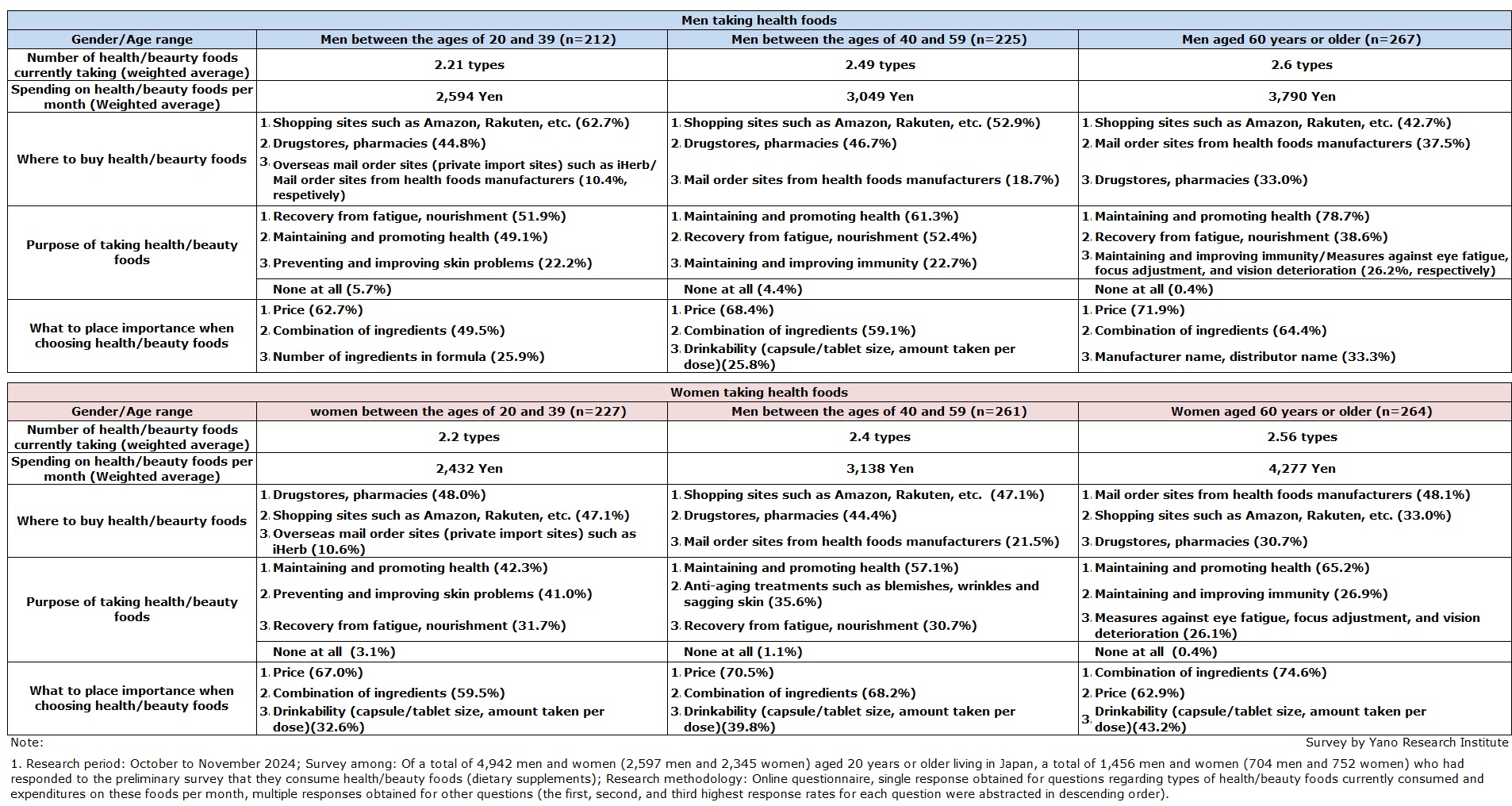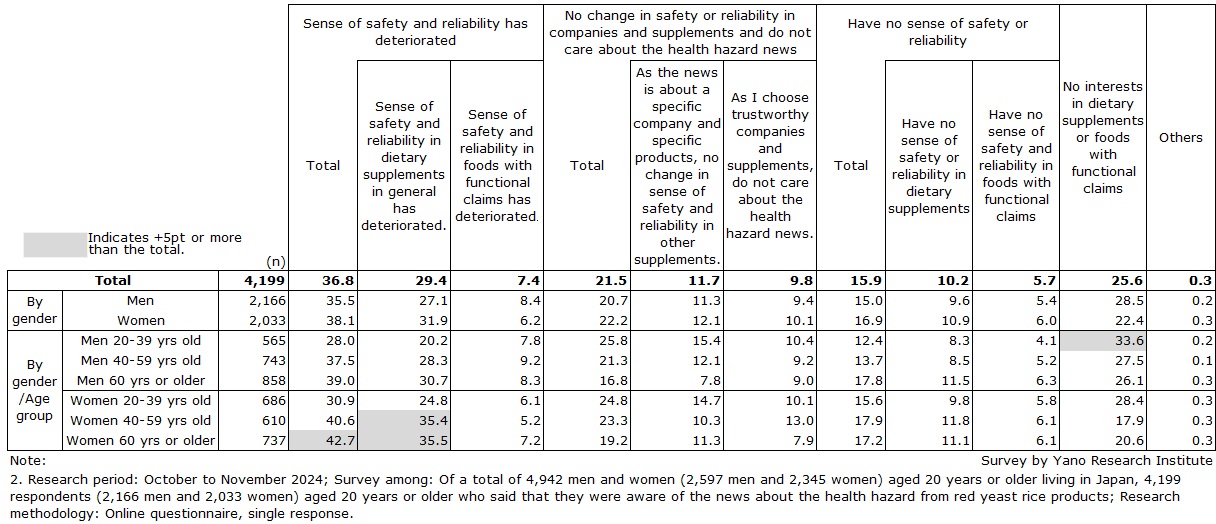No.3722
Consumer Survey on Health Foods in Japan: Key Research Findings 2025
More than 30% of Consumers who Heard the Report on Health Hazards Worsened the Impression of Health Foods (Dietary Supplements) and Foods with Functional Claims
Yano Research Institute (the President, Takashi Mizukoshi) conducted a survey of male and female consumers in their 20s or older living in Japan on health concerns and the status of health food consumption.
The focus here is on the status of health food consumption (types, spending, place of purchase, purposes, what to place importance) and any changes in impressions toward dietary supplements or foods with functional claims after the red yeast rice scandal in 2024.


Summary of Research Findings
In the preliminary survey of 4,942 men and women (2,597 men and 2,345 women) aged 20 years or older living in Japan on their consumption status of health foods (dietary supplements), it was found out that 30 % of them consumed health foods, when the responses “Currently taking health foods (18.7%)”, “Sometimes taking health foods (6.0%)”, and “Only when needed (4.8%)” are included.
For these 30% of respondents, i.e., a total of 1,456 men and women (704 men and 752 women), a more specific secondary survey was conducted on the purchase and consumption of health foods, categorized by age group (from 20 to 39, from 40 to 59, and over 60), and the results were analyzed.
As a result, two or three types of health foods (a weighted average) were consumed by both men and women in all age groups. Regardless of gender, the amount spent per month (a weighted average) on health foods tended to increase with age.
Next, when asked where they purchased health foods, “Shopping sites such as Amazon, Rakuten, etc.” and “Drugstores, pharmacies” ranked high. Many men and women over the age of 60 answered “Mail order site from health food manufacturers”. There were cases of buying from iHerb and other mail order sites from overseas (private import site), which was seen by 10% of men and women in their 20s to 30s.
For the purpose of health food consumption, many male respondents answered, “Recovery from fatigue, nourishment” and “Maintaining and promoting health”. The most common answer by women in all age groups was “Maintaining and promoting health”. “Preventing and improving skin problems” ranked high among women in their 20s and 30s. For the question on what is most important when choosing health foods, “Price” and “Combination of ingredients” received high response rates from both genders and all age groups.
Noteworthy Topics
36.8% of Consumers Who Heard the News on Red Yeast Rice Scandal Said that It Deteriorated the Impression of Health Foods (Dietary Supplements) and Foods with Functional Claims
The news about the health hazard from red yeast rice products was reported in March 2024. Between October and November 2024, a preliminary survey of 4,942 men and women (2,597 men and 2,345 women) aged 20 years or older living in Japan was conducted to determine whether they were aware of the news (single response). The result was that 85% of the total respondents were aware of the report, including those who responded that they “Knew the details of the news (20.9%),” “Knew the outline of the news (48.0%),” and “Heard the news but did not know the details (16.1%),” while “Never noticed of the news” accounted for 15.0%.
When the 4,199 respondents (2,166 men and 2,033 women) who said that they were aware of the news were asked about any changes in their impressions of health foods (dietary supplements) and foods with functional claims, the most common response was “Sense of safety and reliability in dietary supplements in general has deteriorated,” accounting for 29.4%. “Sense of safety and reliability in foods with functional claims have deteriorated” accounted for 7.4%. While the red yeast rice products in question were foods with functional claims, the survey results showed that the impressions of dietary supplements in general, not just foods with functional claims, seem to have deteriorated.
It is imperative for dietary supplement companies to rebuild trust by reaffirming the safety appeal of their products.
Research Outline
2.Research Object: A total of 4,942 men and women (2,597 men and 2,345 women) aged 20 or older living in Japan
3.Research Methogology: Online consumer survey (questionnaire)
Consumer Survey on Health Foods
A preliminary survey was conducted from October to November 2024 among a total of 4,942 men and women (2,597 men and 2,345 women) aged 20 years or older living in Japan on their health/beauty measures and their consumption status of health foods (dietary supplements) or foods with health claims (foods with functional claims and foods for specified health uses (FOSHU)). A more detailed secondary survey was conducted among a total of 1,456 men and women (704 men and 752 women) who had responded to the preliminary survey that they used health foods (dietary supplements). The focus here is on the status of health food consumption (types, spending, place of purchase, purposes, importance) and any changes in impressions towards dietary supplements or foods with functional claims by age group (in their 20s to 30s, in their 40s to 50s, and over 60s) after the red yeast rice scandal reported in 2024, and discloses the analyzed results.
Note: Health foods (dietary supplements) in this research refer to foods in the form of tablets, capsules, powders, or bottled liquid that are intended for health maintenance and promotion, beauty, etc., and do not include pharmaceuticals and quasi-drugs.
<Products and Services in the Market>
Health foods (dietary supplements), Foods with functional claims, foods for specified health uses (FOSHU)
Published Report
Contact Us
The copyright and all other rights pertaining to this report belong to Yano Research Institute.
Please contact our PR team when quoting the report contents for the purpose other than media coverage.
Depending on the purpose of using our report, we may ask you to present your sentences for confirmation beforehand.